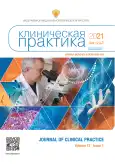KRAS and NRAS genes mutations as biomarkers in the therapy of colorectal cancer and the basic methods of their detection
- Authors: Brovkina O.I.1, Nikitin A.G.1
-
Affiliations:
- Federal Research and Clinical Center of Specialized Medical Care and Medical Technologies FMBA of Russia
- Issue: Vol 12, No 1 (2021)
- Pages: 66-71
- Section: Reviews
- URL: https://journals.rcsi.science/clinpractice/article/view/63875
- DOI: https://doi.org/10.17816/clinpract63875
- ID: 63875
Cite item
Full Text
Abstract
Determination of the mutations' status in the KRAS and NRAS genes is a necessary requirement in the treatment of patients with colorectal cancer (CRC). Patients with certain mutations in the KRAS and NRAS genes are resistant to anti-EGFR drug therapy and have a lower median survival rate than those with WT (wild type) genotypes, that indicates a negative prognosis in the case when mutations are present. Currently, there are no registered targeted drugs for carriers of the KRAS and NRAS genes mutations, however, preparations based on small molecules are under way. The gold standard for detecting mutations in the KRAS and NRAS genes is the analysis of the biopsy material in paraffin blocks. However, this method has significant limitations that can be circumvented by the analysis of circulating tumor DNA — a promising new method in the diagnosis of colorectal cancer.
Full Text
##article.viewOnOriginalSite##About the authors
Olga I. Brovkina
Federal Research and Clinical Center of Specialized Medical Care and Medical Technologies FMBA of Russia
Email: brov.olia@gmail.com
ORCID iD: 0000-0002-0946-7331
SPIN-code: 3631-1397
Cand. Sci. (Biol.)
Russian Federation, 28, Orekhovy boulevard, Moscow, 115682Alexey G. Nikitin
Federal Research and Clinical Center of Specialized Medical Care and Medical Technologies FMBA of Russia
Author for correspondence.
Email: avialn@gmail.com
ORCID iD: 0000-0001-9762-3383
SPIN-code: 3367-0680
Cand. Sci. (Biol.)
Russian Federation, 28, Orekhovy boulevard, Moscow, 115682References
- Haggar FA, Boushey RP. Colorectal cancer epidemiology: incidence, mortality, survival, and risk factors. Clin Colon Rectal Surg. 2009;22(4):191–197. doi: 10.1055/s-0029-1242458
- Ferlay J, Soerjomataram I, Dikshit R, et al. Cancer incidence and mortality worldwide: sources, methods and major patterns in GLOBOCAN 2012. Int J Cancer. 2015;136(5):E359–386. doi: 10.1002/ijc.29210
- Pancione M, Remo A, Colantuoni V. Genetic and epigenetic events generate multiple pathways in colorectal cancer progression. Pathol Res Int. 2012;2012:509348. doi: 10.1155/2012/509348
- Bishehsari F, Mahdavinia M, Vacca M, et al. Epidemiological transition of colorectal cancer in developing countries: Environmental factors, molecular pathways, and opportunities for prevention. World J Gastroenterol. 2014;20(20):6055–6072. doi: 10.3748/wjg.v20.i20.6055
- Kondo Y, Issa JP. Epigenetic changes in colorectal cancer. Cancer Metastasis Rev. 2004;23(1-2):29–39. doi: 10.1023/a:1025806911782
- Cohen R, Pudlarz T, Delattre JF, et al. Molecular targets for the treatment of metastatic colorectal cancer. Cancers (Basel). 2020;12(9):2350. doi: 10.3390/cancers12092350
- Issa JP. Colon Cancer: It’s CIN or CIMP. Clin Cancer Res. 2008;14(19):5939–5940. doi: 10.1158/1078-0432.CCR-08-1596
- Kwong LN, Dove WF. APC and its modifiers in colon cancer. Adv Exp Med Biol. 2009;656:85–106. doi: 10.1007/978-1-4419-1145-2_8
- Linardou H, Briasoulis E, Dahabreh IJ, et al. All about KRAS for clinical oncology practice: gene profile, clinical implications and laboratory recommendations for somatic mutational testing in colorectal cancer. Cancer Treat Rev. 2011;37(3):221–233. doi: 10.1016/j.ctrv.2010.07.008
- Писарева Е.Е., Любченко Л.Н., Коваленко С.П., Шаманин В.А. Анализ мутаций в генах KRAS и BRAF при раке толстой и прямой кишки в российской популяции // Сибирский онкологический журнал. 2016. Т. 15, № 2. С. 36–41. [Pisareva EE, Ljubchenko LN, Kovalenko SP, Shamanin VA. Analysis of mutations in kras and braf genes in colorectal cancer in Russian patients. Siberian Journal of Oncology. 2016;15(2):36–41. (In Russ).] doi: 10.21294/1814-4861-2016-15-2-36-41
- Vaughn CP, Zobell SD, Furtado LV, et al. Frequency of KRAS, BRAF, and NRAS mutations in colorectal cancer. Genes Chromosomes Cancer. 2011;50(5):307–312. doi: 10.1002/gcc.20854
- Molina JR, Adjei AA. The Ras/Raf/MAPK Pathway. J Thorac Oncol Elsevier, 2006;1(1):7–9.
- Grothey A, Lenz HJ. Explaining the unexplainable: EGFR antibodies in colorectal cancer. J Clin Oncol. 2012;30(15):1735–1737. doi: 10.1200/JCO.2011.40.4194
- Lièvre A, Bachet JB, Corre DL, et al. KRAS mutation status is predictive of response to cetuximab therapy in colorectal cancer. Cancer Res. 2006;66(8):3992–3995. doi: 10.1158/0008-5472.CAN-06-0191
- Cox AD, Fesik SW, Kimmelman AC, et al. Drugging the undruggable RAS: Mission Possible? Nat Rev Drug Discov. 2014;13(11):828–851. doi: 10.1038/nrd4389
- Diaz LA, Williams R, Wu J, et al. The molecular evolution of acquired resistance to targeted EGFR blockade in colorectal cancers. Nature. 2012;486(7404):537–540. doi: 10.1038/nature11219
- Lampson BL, Pershing NL, Prinz JA, et al. Rare codons regulate KRas oncogenesis. Curr Biol. 2013;23(1):70–75. doi: 10.1016/j.cub.2012.11.031
- Porru M, Pompili L, Caruso C, et al. Targeting KRAS in metastatic colorectal cancer: current strategies and emerging opportunities. J Exp Clin Cancer Res. 2018;37(1):57. doi: 10.1186/s13046-018-0719-1
- Liu M, Sjogren AK, Karlsson C, et al. Targeting the protein prenyltransferases efficiently reduces tumor development in mice with K-RAS-induced lung cancer. Proc Natl Acad Sci U S A. 2010;107(14):6471–6476. doi: 10.1073/pnas.0908396107
- Tejpar S, Celik I, Schlichting M, et al. Association of KRAS G13D tumor mutations with outcome in patients with metastatic colorectal cancer treated with first-line chemotherapy with or without cetuximab. J Clin Oncol. 2012;30(29):3570–3577. doi: 10.1200/JCO.2012.42.2592
- Tural D, Selcukbiricik F, Erdamar S, et al. Association KRAS G13D tumor mutated outcome in patients with chemotherapy refractory metastatic colorectal cancer treated with cetuximab. Hepatogastroenterology. 2013;60(125):1035–1040. doi: 10.5754/hge12983
- Kapp JR, Diss T, Spicer J, et al. Variation in pre-PCR processing of FFPE samples leads to discrepancies in BRAF and EGFR mutation detection: a diagnostic RING trial. J Clin Pathol. 2014;68(2):111–118. doi: 10.1136/jclinpath-2014-202644
- Емельянова М.А., Мазуренко Н.Н., Гагарин И.М., и др. Определение мутаций в гене EGFR при немелкоклеточном раке легкого с помощью биологических микрочипов // Вестник РОНЦ им. Н.Н. Блохина РАМН. 2012. Т. 23, № 3. P. 15–23. [Emel’yanova MA, Mazurenko NN, Gagarin I., et al. EGFR mutation detection using biological microchips in non-small cell lung cancer. Jornal of N.N. Blokhin Russian Cancer Research Center RAMS. 2012;23(3):15–23. (In Russ).]
Supplementary files






